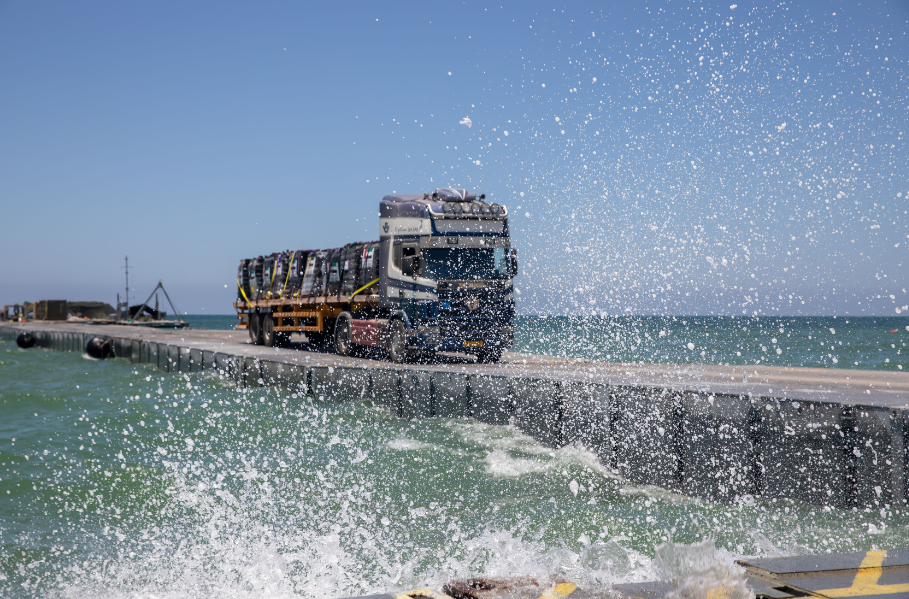
UPDATE:
There have been reports in the media that DoD may end operation of the Gaza pier earlier than originally expected.
After the pier was once again re-anchored to Gaza yesterday and humanitarian aid deliveries resumed, Pentagon Press Secretary Air Force Maj. Gen. Pat Ryder assured the media that DoD will not be ending the mission anytime soon.
“While it’s always been our intention for the pier to be a temporary solution as part of the broader international effort to surge humanitarian assistance into Gaza to meet the urgent needs of the Palestinian people, we have not established an end date for this mission as of now,” he said.
ORIGINAL POST:
During his March 7 State of the Union Address, as health authorities were warning that Gaza was “on the precipice of famine,” President Biden announced an ambitious project that, when fully operational, would permit the delivery of up to 2,000,000 meals (up to 150 truckloads of aid) per day for Gaza’s 2.3 million people.
The project, known as JLOTS, or “Joint Logistics Over-the-Shore” capability, would consist of a floating dock about three miles off the Gaza shore, a floating pier attached to an approximately 1,800-foot-long modular causeway anchored to the shore and, finally, a group of logistic support vessels (LSVs) to transport the aid from the dock to the pier/causeway.
JLOTS is a capability that has previously been successfully deployed for humanitarian relief in places such Haiti, Somalia, and Kuwait.
At the time, DoD estimated that JLOTS could be operational in 60 days, and the cost was estimated to be “at least $320 million.”
To the credit of the brass responsible for the Trident Pier (The U.S. Central Command), the temporary pier was anchored to the beach in Gaza after only sixty-seven days. One day later, on May 17, the first trucks carrying humanitarian aid began rolling down the temporary pier.
The cost is now reported to be $230 million, its price drop attributed partly to British contributions.
There have been, and continue to be, serious problems, most of them related to unanticipated weather conditions.
On May 25, high winds and heavy seas caused four vessels that are used to stabilize the floating pier to break free from their anchors and become beached after losing power.
Three days later, a portion of the Trident Pier that was anchored into the Gaza coastline was damaged also in heavy seas.
The pier was removed from its location on the Gaza coast and taken to the Israeli port of Ashdod where it was repaired and then returned to Gaza.
A couple of weeks later, amid concerns that heavy seas would once again damage the pier, it was dismantled and moved back to the Israeli port of Ashod.
On June 7, the pier was reopened and humanitarian aid was once again being delivered to the people of Gaza.
However, it was once again temporarily shut down June 9-10, due to high seas, and deliveries resumed on June 11.
And just last Friday, the Pentagon said it would tow back the pier to Ashdod “to prevent structural damage caused by the heightened sea state.”
The pier has now, once again, been re-anchored.
Although the pier has been fully in service for only about ten days since it was attached to the shoreline, over 3,500 metric tons (7.7 million pounds) of humanitarian aid have been delivered through the maritime corridor.
In addition to weather and sea conditions problems, JLOTS has been fraught with logistical problems, security concerns, looting of the cargo coming off the pier by desperate Palestinians. Some U.S. servicemembers have also suffered accidental injuries.
And, from the very beginning, there has been political sniping by some in Congress.
Two weeks ago, citing some of the JLOTS setbacks, Senator Roger Wicker, the top Republican on the Senate Armed Services Committee, said, “This irresponsible and expensive experiment defies all logic except the obvious political explanation: to appease the President’s far-left flank. This needs to end immediately.”
The concerns and sniping have now grown into a full-blown attack on the project, bordering on gloating over the setbacks, especially by the right-wing media.
Calling it “Biden’s $230M Gaza boondoggle…folly,” RedState proudly crows that it predicted it would be “an abject failure.”
HotAir, writes, “Calling this a failure is being pretty generous at this point. It is an epic failure and embarrassment for the Biden administration and, unfortunately, for the United States.”
And now, “[a] pair of bills advanced last week in the House [seeking] to end the mission that was billed as the Biden administration’s flagship effort to aid Palestinian civilians on the brink of starvation after months of Israel’s bombardment of the Gaza Strip in its war against Hamas.”
During the House Appropriations Committee’s debate, Rep. Betty McCollum, D-Minn said:
Has it been as successful as we hoped it would? Absolutely not…But do you ever stop trying to provide children food? I don’t think in this country we do that.
Read more about JLOTS here and here.
















